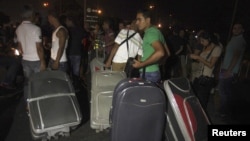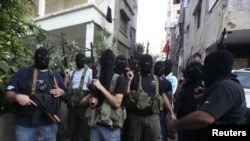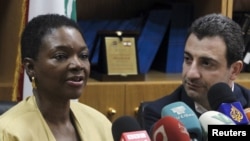BEIRUT — Fears are growing that Lebanon could be drawn further into Syria's conflict, as several Arabian Gulf countries have called on their citizens to immediately leave Lebanon after a rash of kidnappings.
More than 20 Syrians and a Turkish national were reportedly seized in the Bekaa Valley and near Beirut by the powerful Shi'ite Muslim Mikdad family and its supporters this week.
They are angry over the capture of Lebanese national Hassan Salim Mikdad by the rebel Free Syrian Army. He was shown on Lebanese television beaten and bruised and saying he is a member of Hezbollah.
On Wednesday, Mikdad family supporters vandalized dozens of Syrian-run stores in a Beirut neighborhood and then blocked the airport road with burning tires, prompting one French jet to divert to Cyprus.
Lebanese government officials are reported to be in talks with the Mikdad family to release all their hostages.
Hillal Khashan, a political scientist at American University in Beirut, says the Mikdad clan belongs to the powerful Shi'ite militia and political party, Hezbollah.
“Hezbollah is under pressure from its constituency for not doing anything - or not doing enough - to release the Mikdad man arrested in Syria," explained Khashan. "There is no question about it, the Free Syrian Army said they have evidence that he is a Hezbollah fighter alongside the [President Bashar] Assad forces. They made it very clear they would not release him even if Hezbollah and the Mikdad family takes scores of Syrians hostage.”
Khashan says the issue is that Hezbollah feels embarrassed. He says the powerful group cannot do anything to rescue Hassan Mikdad and they feel that the Free Syrian Army tried to sensationalize his capture. But he says the confrontation is not likely to ignite sectarian strife in fragile Lebanon.
“It is not in the interest of Hezbollah to allow the matter to escalate," said Khashan. "They are not interested in a civil war. They don't feel that a civil war in Lebanon would serve their objective.”
But Lebanon remained tense as the road to Beirut's international airport reopened Thursday morning. Arab Gulf countries including Saudi Arabia, Qatar, Kuwait and the United Arab Emirates have urged their nationals to leave Lebanon immediately in the wake of the kidnappings.
Meanwhile, the U.N.'s humanitarian chief, Valerie Amos, canceled a planned visit to Syrian refugees in Lebanon's Bekaa Valley in the wake of the kidnappings, saying her security officers had advised her not to go there.
Amos wrapped up a two-day visit to Damascus with a stop in Beirut. She told reporters that when the United Nations carried out aid assessments at the end of March there were about one million Syrians in need. She says that number has now more than doubled.
“Our view is that number has probably gone up to about 2.5 million," said Amos. "This is the people in Syria itself, separate to that of course, there are the people who have fled over the borders into Jordan, coming here to Lebanon, but also into Turkey and Iraq as refugees.”
She said she has been unable so far to persuade the Syrian government to allow in large international aid agencies that the United Nations needs to help it meet the needs of such a large number of people.
Amos dismissed the Syrian government's concern that such aid might reach the armed groups it is fighting, saying humanitarian work is done in an independent and impartial way.
More than 20 Syrians and a Turkish national were reportedly seized in the Bekaa Valley and near Beirut by the powerful Shi'ite Muslim Mikdad family and its supporters this week.
They are angry over the capture of Lebanese national Hassan Salim Mikdad by the rebel Free Syrian Army. He was shown on Lebanese television beaten and bruised and saying he is a member of Hezbollah.
On Wednesday, Mikdad family supporters vandalized dozens of Syrian-run stores in a Beirut neighborhood and then blocked the airport road with burning tires, prompting one French jet to divert to Cyprus.
Lebanese government officials are reported to be in talks with the Mikdad family to release all their hostages.
Hillal Khashan, a political scientist at American University in Beirut, says the Mikdad clan belongs to the powerful Shi'ite militia and political party, Hezbollah.
“Hezbollah is under pressure from its constituency for not doing anything - or not doing enough - to release the Mikdad man arrested in Syria," explained Khashan. "There is no question about it, the Free Syrian Army said they have evidence that he is a Hezbollah fighter alongside the [President Bashar] Assad forces. They made it very clear they would not release him even if Hezbollah and the Mikdad family takes scores of Syrians hostage.”
Khashan says the issue is that Hezbollah feels embarrassed. He says the powerful group cannot do anything to rescue Hassan Mikdad and they feel that the Free Syrian Army tried to sensationalize his capture. But he says the confrontation is not likely to ignite sectarian strife in fragile Lebanon.
“It is not in the interest of Hezbollah to allow the matter to escalate," said Khashan. "They are not interested in a civil war. They don't feel that a civil war in Lebanon would serve their objective.”
But Lebanon remained tense as the road to Beirut's international airport reopened Thursday morning. Arab Gulf countries including Saudi Arabia, Qatar, Kuwait and the United Arab Emirates have urged their nationals to leave Lebanon immediately in the wake of the kidnappings.
Meanwhile, the U.N.'s humanitarian chief, Valerie Amos, canceled a planned visit to Syrian refugees in Lebanon's Bekaa Valley in the wake of the kidnappings, saying her security officers had advised her not to go there.
Amos wrapped up a two-day visit to Damascus with a stop in Beirut. She told reporters that when the United Nations carried out aid assessments at the end of March there were about one million Syrians in need. She says that number has now more than doubled.
“Our view is that number has probably gone up to about 2.5 million," said Amos. "This is the people in Syria itself, separate to that of course, there are the people who have fled over the borders into Jordan, coming here to Lebanon, but also into Turkey and Iraq as refugees.”
She said she has been unable so far to persuade the Syrian government to allow in large international aid agencies that the United Nations needs to help it meet the needs of such a large number of people.
Amos dismissed the Syrian government's concern that such aid might reach the armed groups it is fighting, saying humanitarian work is done in an independent and impartial way.






